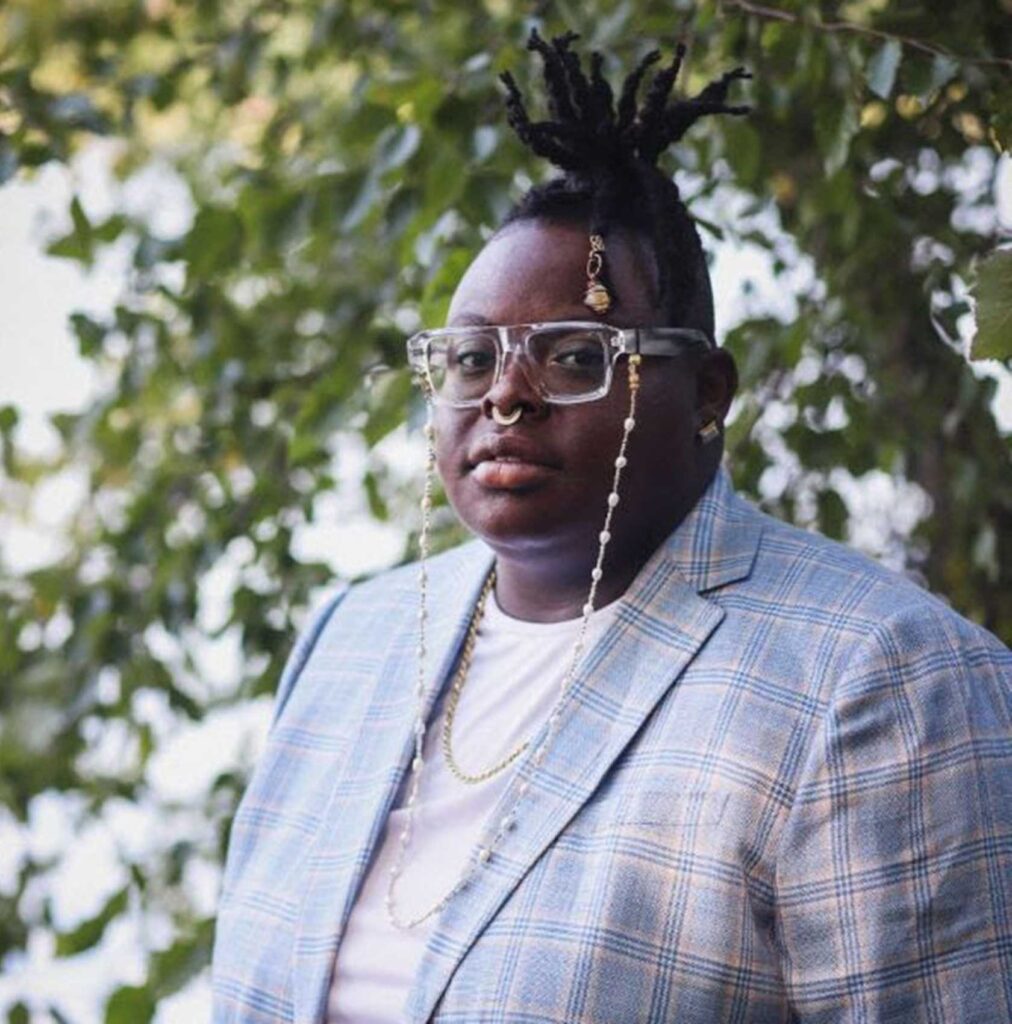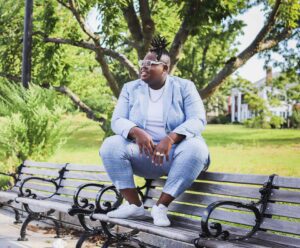Nearing the end of her term, Boston’s poet laureate Porsha Olayiwola reflects on her journey

When Porsha Olayiwola was named Boston’s third poet laureate, she had just started her MFA program at Emerson. Still discovering who she was as a poet, she experienced some imposter syndrome at first, she admitted, but ultimately accepted the title and its associated responsibilities as a “gift.”
“It felt a little unbelievable,” she said of receiving the news many years ago.
Since 2019, in her role as the city’s poet laureate, Olayiwola has helped create the Boston Youth Poet Laureate program, founded the biannual Roxbury Poetry Festival, held open-to-all office hours at the Boston Public Library, mentored other poets and written many commissioned pieces.
In December, Olayiwola will have to hand over the baton when her term ends.
The 36-year-old poet and educator said she’s a “little sad because there’s always so much more work to do.” But she’s also excited to have more time to dedicate to her craft.
Olayiwola began putting pen to paper in elementary school.
“I’ve always been a writer,” she said. Through writing, she processed herself “in the context of the world.” As young as third grade, she started writing what she calls “theories on life,” paragraphs on what she thought life was about.
For example, she was teased for having dark skin. So, she wrote a theory on life about the incidents.
“I remember writing this one particularly that was to say, ‘If my mother told me to go to the store to get something and somebody called [me names, it] doesn’t matter because at the end of the day, I’m still gonna bring back what my mother asked me to bring back.’” In other words, nothing can deter you from continuing on your path.
These theories, which she said still believes to this day, evolved into a love of poetry. When she was 10 years old, Olayiwola began reciting poetry at school assemblies and, in the eighth grade, wrote her first poem.
Decades later, she has written many pieces, some of which she assembled into a book called “I Shimmer Sometimes, Too.” Much like her theories, the purpose of poems is to answer questions.
In one from 2019 titled, “Had My Parents Not Been Separated After My Father’s Traffic Stop, Arrest and Deportation,” Olayiwola asks and speculates what life would’ve been like in the absence of these defining moments.
“We might all be sitting about the pink kitchen table with the white legs. My father, a taxi driver, might have come late in the evening with two large chuck steaks bloodied, red, fresh, best he could bring,” the poem starts.
“What I really wanted to do,” she said, “was to kind of situate joy a little bit. [It’s] hypothetical, but the reality is it’s also just what the past looked like. And so I kind of wanted to just do a fond memory of us as a family.”
Born to an African American mom and a Nigerian dad, Olayiwola was raised in the Southside of Chicago. Growing up in a majority Black part of the city was “incredible,” she said. As a young girl, she was independent, in part because she was the middle child of three, and in part because her father was deported to Nigeria — and is still there — when she was in third grade.
Some of her most treasured childhood memories include indulging her inner nerd at the library downtown, taking trips to the beach or the lake, and participating in the city’s extravagant back-to-school parade.
Here in Boston, where she moved in 2010, Olayiwola found a different kind of home — a smaller, more “manageable” one with a “neighborhood familiar feeling that I really, really love.” Less than a decade into her time in Boston, Olayiwola was named the city’s third Poet Laureate, succeeding Sam Cornish and Danielle Legros Georges, the first and second poet laureates.
As she wraps up her term, Olayiwola is also working on a new manuscript. In her poems, she incorporates themes of Afrofuturism and surrealism. Her new body of work, though, will tackle different themes and even depart from her norm.
The poet said she plans to tackle the history of water in the Black diaspora. She has visited sites of water in the Black diaspora, many of them sites of trauma — the Middle Passage, fire hydrants, and the water hoses weaponized during the civil rights movement.
She also frequently makes room for joy in her writing. “I Shimmer Sometimes, Too,” includes odes to different dances she likes, including the Milly Rock and the Chicago Two-Step.
In “The Electric Slide Is Not A Dance!” she writes that the choreographed jig seen at many events is “a transmission code.” She continues, “What I’m trying to tell you is every time I need to leave here, every time I need to get to a place that feels like my mama’s cooking or my brother’s cackle booming from soot, I sound the gathering.”
She will also explore the historical context of food and her relationship to it as a Black, queer, fat woman.
“It’s about positioning desire and hunger together, and maybe even gluttony in the way that is terrible and not good,” she said, “and also in a way that is like, ‘You should have that. You should enjoy that. You should indulge.’”
In her final six months as the Boston poet laureate, Olayiwola said she hopes to collect poems from residents of the city that she will then compile into an anthology. This project would hopefully culminate in a reading at the end of the year.
Her greatest accomplishment thus far has been working with her students and youth mentees. “It’s like one of my greatest joys,” she said. Another top career moment? Writing a poem in honor of the late Boston Celtics basketball player Bill Russell and performing it at an NBA game.







